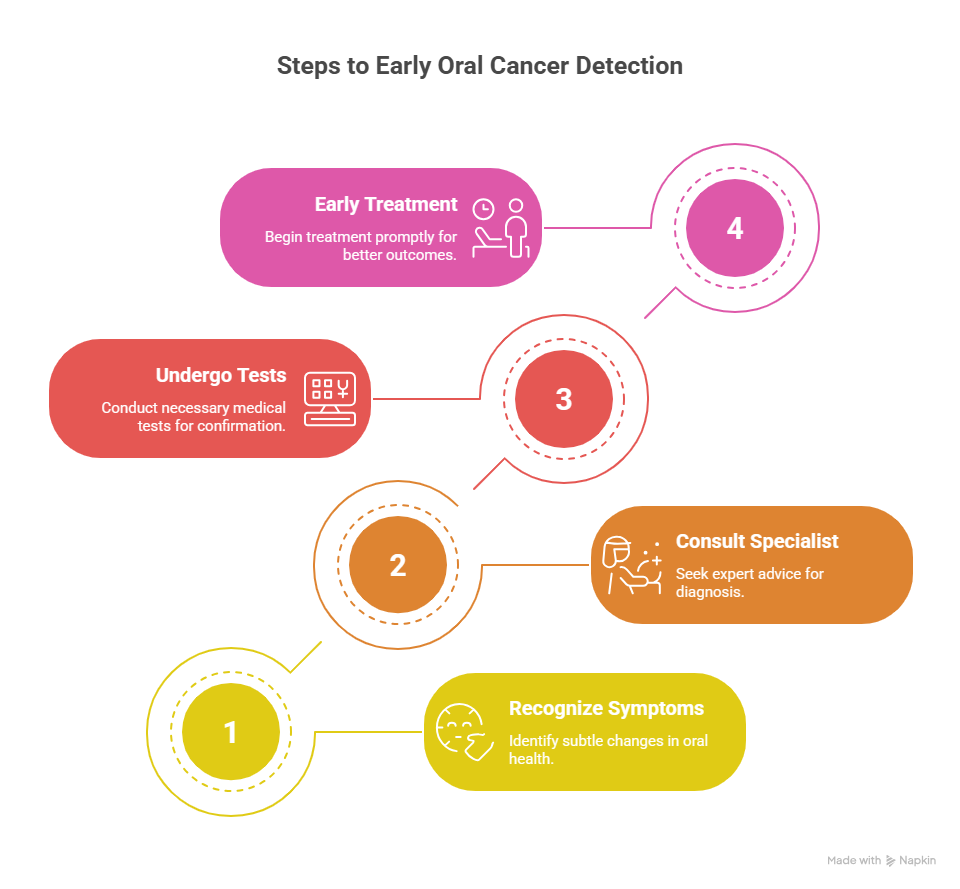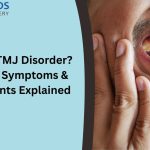Oral cancer is a serious and potentially life-threatening disease that can develop in any part of the mouth, including the lips, tongue, cheeks, gums, and roof or floor of the mouth. Despite medical advancements, early detection remains the most crucial factor for successful treatment. A question I am frequently asked is, “What are the symptoms of oral cancer?” The truth is, oral cancer can be subtle in its early stages, but there are warning signs that everyone should be aware of.
As a specialist at one of the best maxillofacial surgeon in India, I, Dr. Suresh, aim to provide comprehensive awareness so patients can act early. This guide will walk you through the top symptoms, risk factors, and what to do if you notice anything unusual in your oral health.

So, What Are the Symptoms of Oral Cancer?
The symptoms can vary, but here are five of the most common and important signs:
1. Persistent Mouth Sores
A sore in the mouth that doesn’t heal within two weeks should be examined by a healthcare professional. Unlike normal mouth ulcers, cancerous sores may be painless, irregular in shape, and prone to bleeding.
If you’re wondering, what are the symptoms of oral cancer, persistent ulcers or lesions are among the most overlooked yet common indicators.
2. Red or White Patches
Unusual red (erythroplakia), white (leukoplakia), or mixed patches inside the mouth may signal precancerous changes. These patches may appear on the gums, tongue, inner cheeks, or roof of the mouth.
The best maxillofacial hospital in Hyderabad regularly sees patients referred with these patches, some of which have led to early diagnosis and successful treatment.
3. Difficulty Swallowing or Chewing
If eating becomes uncomfortable or painful, it could indicate a tumor affecting the throat, tongue, or inner lining of the mouth. You may feel a sensation of something stuck in your throat or experience hoarseness that doesn’t improve.
Again, what are the symptoms of oral cancer? Difficulty with simple functions like swallowing should always raise a red flag.
4. Unexplained Bleeding or Numbness
Spontaneous bleeding in the mouth, especially without brushing or trauma, could be a warning sign. Likewise, numbness in the lips, tongue, or jaw area that persists is abnormal and warrants investigation.
Early diagnosis of such symptoms at a best maxillofacial hospital in India dramatically improves outcomes, even in advanced stages.
5. Lumps or Thickening in the Mouth or Neck
Swelling, lumps, or a thickening in the cheeks, neck, or jaw may indicate spreading cancer. These masses might be painless, which makes them easy to ignore, but their presence should never be taken lightly.
If you’re still asking what are the symptoms of oral cancer, this is one of the most definitive signs that needs urgent medical evaluation.
Additional Symptoms to Watch
- Chronic bad breath
- Loose teeth without clear cause
- Difficulty speaking or moving the jaw
- Unexplained weight loss
- Chronic sore throat or ear pain
The earlier you recognize these symptoms, the higher your chances of a full recovery.
Who Is at Risk of Oral Cancer?
Several factors increase the likelihood of developing oral cancer:
- Tobacco use (smoking and smokeless)
- Heavy alcohol consumption
- Human papillomavirus (HPV) infection
- Poor oral hygiene
- Excessive sun exposure (lip cancer)
- Genetic predisposition
At our facility, recognized as the best maxillofacial hospital in Hyderabad, we routinely counsel high-risk individuals on preventive screening and lifestyle changes.
Diagnosis and Screening
If you present with any of the symptoms listed above, your doctor may perform:
- Visual and tactile oral examination
- Biopsy of suspicious tissue
- Imaging tests (X-ray, MRI, CT scan)
- HPV testing
As Dr. Suresh, I stress the importance of routine dental checkups and oral screenings for everyone over age 40 or with known risk factors.
Treatment Options
Treatment depends on the stage and location of the cancer:
- Surgery: Removal of the tumor and surrounding tissue
- Radiation therapy: Often used post-surgery or as a standalone treatment
- Chemotherapy: Used in advanced or metastatic cases
- Targeted drug therapy: Newer options for specific genetic types
The team at our best maxillofacial hospital in India uses a multidisciplinary approach for maximum patient survival and quality of life.

Life After Oral Cancer
Recovery may involve:
- Speech and swallowing therapy
- Nutritional counseling
- Psychological support
- Long-term follow-up for recurrence
We focus not just on survival, but on complete rehabilitation.
Prevention Tips
- Quit tobacco and limit alcohol
- Use SPF lip balm outdoors
- Get HPV vaccinations
- Maintain good oral hygiene
- Eat a balanced, antioxidant-rich diet
- Get regular dental and oral screenings
Final Thoughts: Awareness Saves Lives
So, what are the symptoms of oral cancer? They include persistent sores, patches, difficulty chewing, unexplained bleeding, and neck lumps. Ignoring these signs can delay diagnosis and reduce survival rates.
At our facility, led by Dr. Suresh at the best maxillofacial hospital in Hyderabad, we provide comprehensive care for early detection, diagnosis, and treatment of oral cancers. If you or someone you love shows any of these symptoms, don’t wait—early action can save lives.
What does a persistent mouth sore indicate?
A sore or ulcer in the mouth that doesn’t heal within two weeks could be an early sign of oral cancer and should be evaluated by a doctor.
Is a lump or thickening in the cheek a cause for concern?
Yes, any unusual lump, swelling, or thick area inside the cheek or jaw that doesn’t go away might be a symptom of oral cancer.
Should I worry about white or red patches in my mouth?
Yes, white (leukoplakia) or red (erythroplakia) patches on the gums, tongue, or lining of the mouth may be precancerous and need medical attention.
Can difficulty swallowing be a symptom of oral cancer?
Yes, trouble chewing, swallowing, or moving the jaw or tongue could indicate a deeper problem like a tumor affecting muscle function.
What if I experience numbness or pain in the mouth?
Persistent numbness, pain, or tenderness in the mouth, face, or neck may signal nerve involvement and should be checked immediately.












